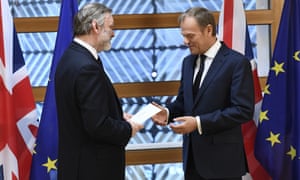
Pic:UK envoy Tim Barrow (left) hands Donald Tusk the letter giving Britain’s formal exit notice.
Political reporter(wp/es):
Theresa May has told Parliament that she accepts Brexit will carry consequences for the United Kingdom, as a letter delivered to Brussels began a two-year countdown to Britain’s departure from the European Union.
The prime minister took to her feet minutes after the European council president, Donald Tusk, confirmed that he had received notification, declaring that “the UK has delivered Brexit” nine months after a bruising referendum campaign.
“We understand that there will be consequences for the UK of leaving the EU. We know that we will lose influence over the rules that affect the European economy. We know that UK companies that trade with the EU will have to align with rules agreed by institutions of which we are no longer a part, just as we do in other overseas markets. We accept that,” she said.
A number of MPs congratulated the prime minister on the tone of her letter to Tusk, which stressed Britain’s commitment to the continent as a close friend and ally. But others accused her of issuing a “blatant threat” to withdraw security cooperation if the EU27 fails to deliver on a trade agreement. The letter suggests that the government hopes to roll the separate issues together, claiming no deal will mean WTO rules but also “mean our cooperation in the fight against crime and terrorism would be weakened”.
May’s spokesman repeatedly insisted placing security and trade relations alongside each other in the letter to Tusk was not intended as a threat. “It’s a simple statement of fact that if we leave the EU without a deal, then the arrangements we have as part of our EU membership will lapse,” he said.
The prime minister made clear that 29 March 2019 would be “a day of celebration for some and disappointment for others” – a point underlined as passionate campaigners on either side of the debate rose after her statement to put forward their arguments.
“The referendum last June was divisive at times. Not everyone shared the same point of view, or voted in the same way. The arguments on both side were passionate,” she said.
May insisted that her government accepted the repeated warnings from European leaders that Britain could not “cherry-pick” during EU negotiations – and that was why it would not be seeking to remain a full member of the single market.
She urged her European counterparts to help secure a “bold and ambitious free trade agreement” between the EU27 and the UK as she promised to approach the talks “constructively, respectfully, and in a spirit of sincere cooperation”. May stressed a number of times that she wanted a “new deep and special partnership” with the rest of the EU.
She made clear that in her eyes, there was now no way to stop the UK’s journey towards Brexit, which she said was her government acting on the “democratic will of the British people”.
“This is an historic moment from which there can be no turning back. Britain is leaving the European Union. We are going to make our own decisions and our own laws. We are going to take control of the things that matter most to us. And we are going to take this opportunity to build a stronger, fairer Britain – a country that our children and grandchildren are proud to call home,” said the prime minister, arguing that leaving the EU was both an “ambition and an opportunity”.
She warned that security in Europe was more fragile than at any time since the cold war, warning that any weakening of cooperation would be a “costly mistake”
No comments:
Post a Comment